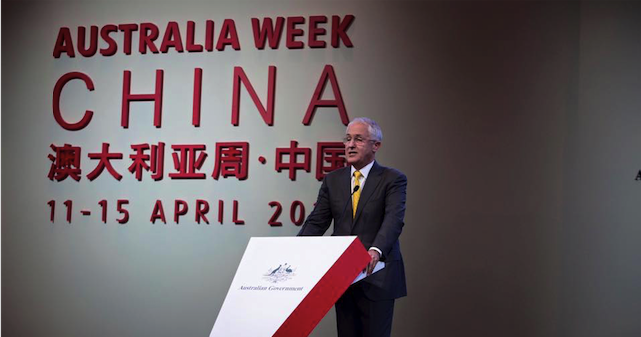Chinese Views of Australian Foreign Policy: Not a Flattering Picture

Prime Minister Malcolm Turnbull is currently in China for a 36-hour “fly-by”. While China is seemingly always a hot topic among Australian foreign policymakers, it is not always the case the other way around.
It is neither novel nor controversial to suggest that the “rise of China” has significant economic and strategic implications for Australia. It is clear that what happens in China is likely to exert a powerful influence on Australia – for better or worse. One of the most striking features of the policy and academic debate in Australia in particular, though, is that it is often conducted with little reference to similar views in China.
Unlikely partners?
The bilateral relationship between Australia and China is in many ways inherently unlikely. China, after all, is still – notionally at least – a communist country and Australia has recently been described as a “staunch defender of neoliberalism.” Whatever the merits of either of these descriptions, the point to emphasise at the outset is that these are very different countries in every respect; their bilateral ties have generally been minimal precisely because of these inherent differences and historical circumstances.
The view from China
The reality is that Australia is less important to China than China is to Australia. Consequently, while there is now a vast amount of scholarly and popular commentary about China and the economic and strategic implications of its development, there is no similar outpouring of analysis and concern in China. From a Chinese perspective, Australia is a middle-ranking middle power whose principal significance is as a reliable supplier of resources and an equally reliable ally of the US.
Rightly or wrongly, there has been widespread public dissatisfaction with Australia’s economic policies, with many in China believing that the economic relationship was significantly tilted in Australia’s favour. The Global Times reported that “87 per cent of 14,000 online respondents believed China should take reprisals through ‘practical measures’ such as boycotting tourism and study in Australia.”
Significantly, there is also a sense that Australia is more reliant on Chinese investment and markets than China is on Australian investment and markets, a sentiment that may have important policy consequences for Australia in the future.
However, for some scholars in China, the key goal should be to develop good relations with strategically important states such as Australia. The rationale for this position is not difficult to discern: even though China’s demand for some resources may have declined somewhat recently, secure supplies of key minerals, energy and agricultural products are likely to remain important for the foreseeable future. Some observers think that there are, therefore, powerful imperatives for China to cultivate good relations with Australia.
Sino-Australian relations
In China, the relatively small group of scholars who are knowledgeable about Australia are trying to highlight its significance and raise the profile of Australia studies at the same time. The claim is made that Australia plays an important role in China’s peripheral strategy for several reasons. First, Australia lies in a key geographical location in the Pacific Ocean, hence maintaining good relations with Australia is increasingly seen as an important component in China’s overall maritime security in particular.
Second, for those observers in China who argue that China’s long-term security is best guaranteed by the creation of a stable, if not harmonious, Asia-Pacific region, friendly relations with Australia are seen as potentially vital. Without the support of Australia, the argument goes, China would not be able to build a positive external environment for its peaceful development.
Third, it is argued that Australia is an important energy provider and market for China, which China can ill afford to alienate. Hence, the already important economic relationship could be further developed and enhanced. The recently concluded free trade agreement between Australia and China is seen as a very positive and important example of this possibility.
How to deal with Sino-Australian relations
The growing appreciation of the constraints on Australian policymakers is also clear in some of the discussions about the influence of the US and Japan on Australian foreign policy. However, there is no consensus on how China is going to deal with this influence. China might develop better relations with Australia, but they will always be tempered and constrained by Australia’s ties with the US and Japan.
A common view in China is that policy efforts should therefore instead be directed towards trying to distance Australia from the US. The Australia–US alliance is seen as a barrier to Australia’s ability to establish good relations not only with China, but also the wider East Asian region. Thus, it is actually in Australia’s own national interest to maintain a distance from the US, rather than being seen as simply an extension of US foreign policy.
This view echoes the debate in Australia in many ways, although in Australia’s case the conventional wisdom – as espoused by successive Australian governments at least – is that policymakers do not have to choose between the US and China, and that it is possible to have good relations with both countries simultaneously.
Mutual understanding
No matter how different Australia and China are, their fates are linked by sheer geography and the dynamics of regional economic development. Unless policymakers and commentators in both China and Australia have a better understanding of how their counterparts see them, an unlikely relationship risks becoming unmanageable. China and Australia may never enjoy the sort of intimacy that exists between the US and Australia, but they both have powerful reasons for making the relationship work. Mutual comprehension is a vital part of the process.
Mark Beeson is Professor of Political Science and International Relations at the University of Western Australia. Dr Jinghan Zeng is Lecturer in Politics and International Relations in the Department of Politics and International Relations at Royal Holloway, University of London. This article has been adapted from a longer article being published in the Australian Journal of International Affairs.





